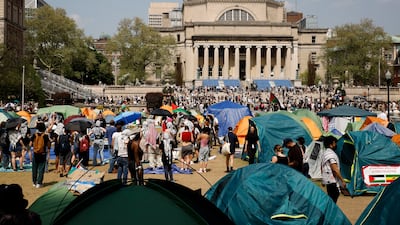Iran and Al Qaeda endorsed pro-Palestinian and anti-war student protests this week, providing new challenges for the movement, which is calling for university divestment from Israel.
Iran's supreme leader Ayatollah Ali Khamenei said in social media posts and a long video on Wednesday that “university students in the United States of America … are standing on the right side of history”.
“You have now formed a branch of the resistance front and have begun an honourable struggle,” said a letter quoted on his X account.
Mr Khamenei's message of support is in sharp contrast to how his own country dealt with anti-government protests in 2022, after the death of a young woman in morality police custody.
The crackdown on the movement, which focused largely on women's rights and demands for reform, led to mass arrests and even death sentences for some protesters.
This week, Al Qaeda also expressed its approval of the student movement.
“We … appreciate and value the movement of western demonstrators and sit-in students from western universities, who through their sit-ins and protests expressed their rejection of the genocide taking place in Gaza,” a statement from Al Qaeda's central command said, according to a translation by the Long War Journal.
Hamas has also expressed support for the demonstrators, calling them “the leaders of the future”.
Izzat Al Risheq of the group's political bureau said students were demonstrating “because of their rejection of the genocide that our Palestinian people are subjected to in the Gaza Strip”.
The group has been designated a terrorist organisation by the US and other countries.
Over the past weeks, students at universities across the US set up tent camps, occupied academic buildings and held protests calling for their universities to divest from investments and academic programmes connected to Israel's actions in the Palestinian territories.
The student movement has been accused of supporting terrorism, and public endorsements by Iran and extremist groups have reignited that criticism.
But critics say the statements appear to be attempts to co-opt the student movement.
There is no evidence that the movement is connected to extremist groups.
Israel supporters and critics have accused participants of sympathising with Hamas due to their pro-Palestine messaging.
Others, including Israeli leaders, have accused protesters of being anti-Semitic.
Students involved in the movement, however, point to the soaring death toll in Gaza – now past 36,200 according to local health authorities – as the impetus for the on-campus pro-Palestine movement that has spread around the world.
Pro-Palestine protesters say they were compelled to act by images of destruction, starvation and displacement in the Gaza Strip.
While there have been reports of some hate incidents, the protests have been mostly peaceful – although some schools have called in police for mass arrests in response.

